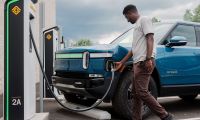There is a good news for electric car owners such as Tesla Model S, Model 3, Nissan Leaf and more. Imagine going to a charging station and by the time you go to a restroom and come back your vehicle is charged giving you 200-300 miles of range. This is exactly what this new groundbreaking battery does cutting EV charging time from 75 minutes to just 5 minutes.
The problem with fast charging
When you rapidly charge your EV battery it degrades when you charge under 50 degrees Fahrenheit. The reason of this degradation is very simple. Rather than the lithium ions smoothly being inserted into the carbon anodes, the lithium deposits in spikes on the anode surface. As a result the cell capacity is reduced. It causes electrical spikes making the condition of your electric car's battery unsafe.
The solution is simple too. If your electric car's battery is heated above the lithium plating threshold it will not exhibit lithium plating. You simply need to find a way to heat your battery either external or internal heating.
Researchers at PennState university found that if the electric car batteries could heat up to 140 degrees F for only 10 minutes while charging and then rapidly cool to ambient temperatures, lithium spikes would not form and and your battery would not degrade due to heat.
To achieve this result the electric car manufacturers must design a rapid battery cooling system.
Imagine how fast the EV adaption rate will grow. It will grow because 10 minute charging will solve one of the most common problems related to EV adoption: the problem of range anxiety.
"We demonstrated that we can charge an electrical vehicle in ten minutes for a 200 to 300 mile range," said Chao-Yang Wang, William E. Diefenderfer Chair of mechanical engineering, professor of chemical engineering and professor of materials science and engineering, and director of the Electrochemical Engine Center at Penn State.
This is a great news because adding to the reduction of EV range anxiety will be major factor toward EV adaption and establishing of more charging stations across the United States.
Does this discovery make you think twice about electric cars and possibly make your net car a fully electric if you know you can charge it within 5-10 minutes? Please, let us know what you think in the comments below.
Also read: 2020 Chevy Bolt EV DC Fast Charging Predictions.
Armen Hareyan is the founder and the Editor in Chief of Torque News. He founded TorqueNews.com in 2010, which since then has been publishing expert news and analysis about the automotive industry. He can be reached at Torque News Twitter, Facebok, Linkedin and Youtube.
Set as google preferred source












Comments
As EV ranges increase, the
Permalink
As EV ranges increase, the need for super fast charging becomes less of an issue. I still believe that the majority of EV and PHEV owners charge at home overnight at a fraction of the cost of public DC fast chargers. With that said, any innovations that improve charging speed are most welcome. Currently many Level 3 DC fast chargers have liquid cooled cables and nozzles, and most modern battery systems have active heating and cooling systems built in, so it could be that EV automakers are already using these heating and cooling techniques to extend battery life. And if not, many could perhaps implement super quick heating and cooling systems to aid in faster charges for those few EV owners who charge up on the road.